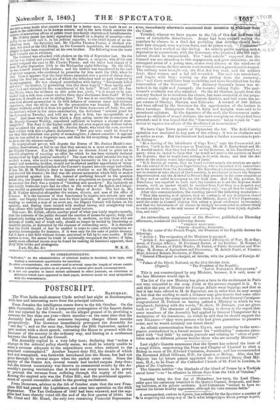POSTSCRIPT.
SATURDAY.
From Jamaica the intelligence comes down to the 8th October. On the 28th September, the bill for a temporary prolongation of the Import-duties Act was rejected by the Council; on the alleged ground of its providing a revenue for less than one year—three months—at the same time that the Assembly had passed other measures imposing charges fifteen months prospectively. The Governor immediately prorogued the Assembly for "one day "; and on the next day, Saturday the 29th September, opened a new session with a short speech, entreating the House to proceed with the business of the country in the ordinary way, and hinting at a conference between the House and the Council.
The Assembly replied in a very lofty tone; declaring that " unless a change in the colonial policy shortly ensue, we shall be utterly unable to raise a revenue adequate to the expenditure even when reduced to the standard contemplated." Another Import.duty Bill, the details of which had not transpired, was forthwith introduced into the House, but had not gone through its several stages when the packet came away. Since the expiry of the Duties Act, several vessels had landed cargoes duty-free; but the utmost uncertainty was thrown on commercial results by the As- sembly's passing resolutions that it would use every means in its power to prevent the revenue from suffering through the expiry of the act. Among the expired acts was the Police Bill; and the provisional appoint- ment of special constables added to the growing excitement.
From Demerara, advices to the 5th of October state that the new Fran- chise Bill had passed the Legislature, and come into operation on the 26th September. The Tax Ordinance of 1847 had been renewed, and the sup- plies had been thereby voted till the end of the first quarter of 1850; but Mr. Croal and Mr. Bland, the only two remaining Financial Representa- lives, immediately afterwards announced their intention the Court.
Trinidad, whence we have papers to the 7th of Octo I
scene of formidable disturbances. Anger had been ex th populace by clauses in a Gaol Act providing that deb stabioteti, ha a their hair cropped, wear a prison dress, and do prison work. " are said to have worked on this feeling. An orderly public Ertl Is WA ?I deputation to remonstrate with the Governor; who promised tti9t lations should be reconsidered. The "mob outside" supposed that the Council was not attending to this engagement, and grew turbulent; on the attempted arrest of a young man, stones were thrown at the windows of the Council-room; further arrests were resisted, and a general milslde ensued. The military were brought out, the Riot Act was read, and the soldiers fired: three women and a lad fell wounded. The mob was nnsubdued, and fought with fury; tearing up the paving from the causeway, &c.; " and there would have been more firing and more bloodshed but for the intervention of the Governor." The Attorney-General's house was at- tacked in the night and damaged; the inmates taking flight. The gaol- keeper's residence was also attacked. On the 2d October, people from the country flocked in to reinforce the rioters, but were overawed at the prepa- rations made: they started to the Eastern districts, and laid waste the su- gar-estates of Dinsley, Macoya, and Eldorado. A reward of 500 dollars had been offered by the Governor for the apprehension of the leaders in these burnings. Immigrants from St. Kitts and Antigua were said to he prominent agitators. At the departure of the mail, the Government main- tained an attitude of armed defence; the most conspicuous rioters had been arrested; and it was hoped dint the " firm measures" taken would be "suf- ficient to repress the efforts of the disaffected at insurrection."


























 Previous page
Previous page